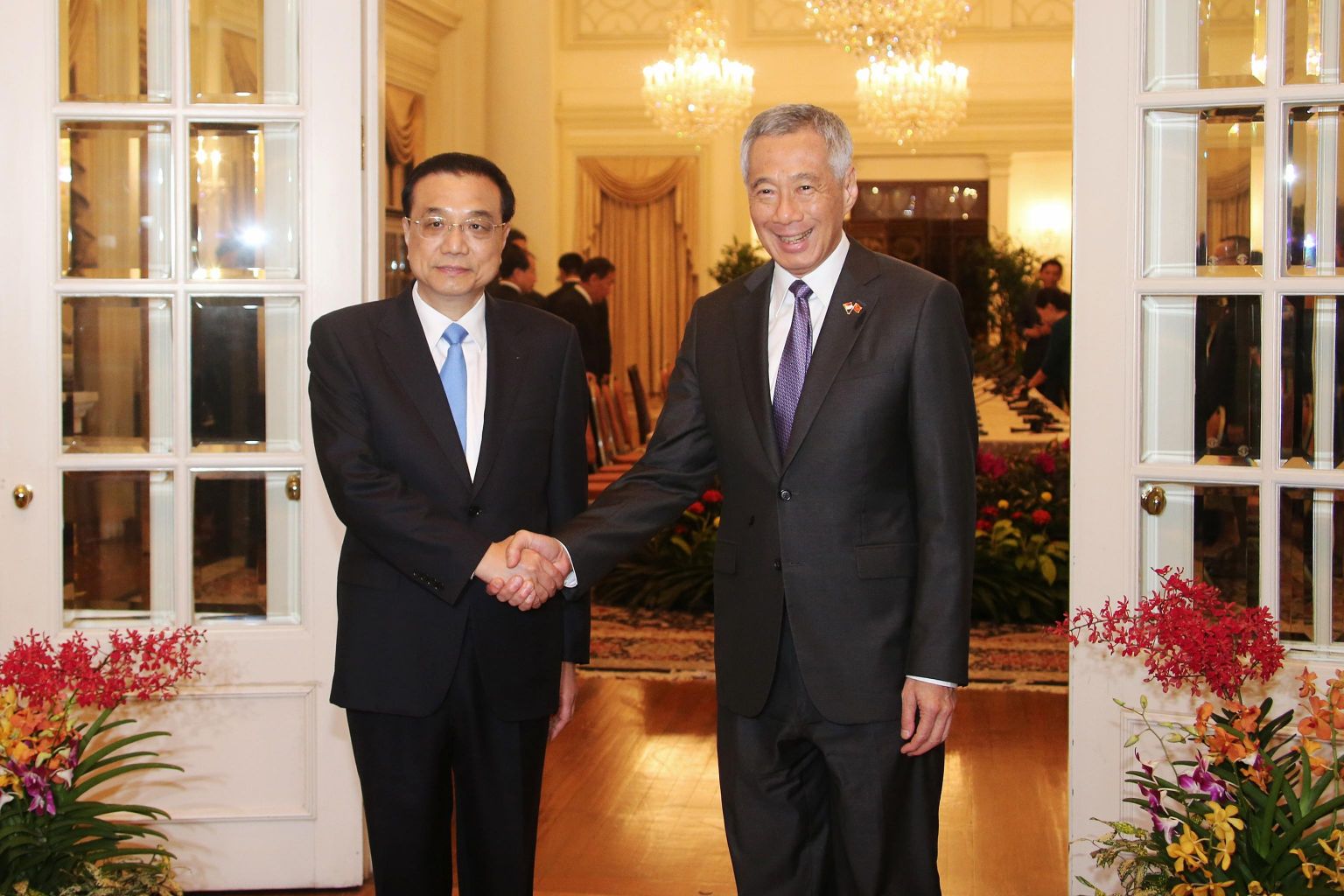Singapore and China sign upgraded FTA as Premier Li Keqiang kicks off official visit
Sign up now: Get ST's newsletters delivered to your inbox

Prime Minister Lee Hsien Loong met Chinese Premier Li Keqiang for a bilateral meeting at the Istana on Nov 12, 2018.
PHOTO: LIANHE ZAOBAO
Follow topic:
SINGAPORE - Singapore businesses will get greater access to the Chinese market and stronger protection for their investments under an upgraded free trade agreement (FTA) inked with China on Monday (Nov 12).
In turn, Singapore has said yes to opening up its air transport, courier and environmental sectors to Chinese companies that want to compete here, while allowing a third Chinese bank full bank privileges.
After negotiations were launched at the end of Chinese President Xi Jinping's first state visit to Singapore in 2015, it was perhaps fitting that his second-in-command, Premier Li Keqiang, would seal the deal during his first official visit here since becoming prime minister in 2013.
On Monday evening, after an expeditious inspection of the guard of honour under dark clouds and lightning flashes outside the Istana main building, Premier Li and Prime Minister Lee Hsien Loong swiftly headed indoors for a meeting, before witnessing the signing of the upgraded FTA, alongside 10 memorandums of understanding.
Later, while proposing a toast to the Chinese Premier at a dinner, PM Lee noted that his visit to Singapore falls on a significant anniversary in bilateral relations: It was on Nov 12 some 40 years ago that Chinese leader Deng Xiaoping made his historic trip to Singapore.
Mr Lee described Singapore and China as "like-minded partners" in many areas, despite having "different circumstances and constraints".
Mr Li said Singapore has played a "unique role" in China's 40 years of reform, and that both sides have benefited from their deepening cooperation.
"China still has a long road to realising modernisation, and we will press on with reforming and opening up," he said, adding that he welcomes Singapore's continued participation.
Singapore was the first Asian country to have a comprehensive free trade agreement with China in 2009. Since then, bilateral trade has grown at 4.6 per cent and investments at 12.2 per cent a year on average. Last year, total bilateral trade between Singapore and China reached $137.1 billion.
China has been Singapore's largest trading partner since 2013 and also Singapore's top foreign investment destination.
The updated FTA brings both sides up to speed on new developments and opens the door wider both ways.
Singapore will now have more access to China's legal, maritime and construction services sectors.
For instance, Singapore law firms that have set up offices in the Shanghai Free Trade Zone can now partner Chinese law firms to offer domestic and international legal services to clients anywhere in China.
Singapore shipping and ship management companies will be able to form majority-owned and wholly owned foreign enterprises in the free trade zones of China's major port cities of Shanghai, Guangdong, Tianjin and Fujian.
And Singapore construction companies in the Shanghai Free Trade Zone, China-Singapore Suzhou Industrial Park, Sino- Singapore Tianjin Eco-city or the China-Singapore (Chongqing) Demonstration Initiative (CCI) can now take on joint building projects in the whole of Shanghai, Suzhou, Tianjin and Chongqing.
More petrochemical exports from Singapore will also qualify for preferential treatment when imported into China. Petrochemical products are among Singapore's top exports to China, accounting for one-quarter of Singapore's total exports to China last year.
In turn, Singapore will liberalise its courier and environmental sectors to Chinese companies by allowing them to deliver parcels and documents in Singapore, as well as provide refuse collection, refuse disposal and waste management services.
Singapore will also grant one additional Chinese bank the scope to conduct the full range of banking businesses in Singapore.
The upgraded FTA also includes improvements to investment protection, Customs procedures and trade facilitation, while introducing new chapters on competition, the environment and e-commerce.
One MOU inked on Monday is an agreement to jointly develop the New International Land-Sea Trade Corridor under the CCI. Formerly known as the CCI-Southern Transport Corridor, this economic link will connect Chongqing to Qinzhou in southern Guangxi region by rail, and from Qinzhou to Singapore and beyond by sea, joining western China to South-east Asia and other parts of the world.
There are also plans to jointly develop a Sino-Singapore International Technology Innovation Cooperation Demonstration Area under the China-Singapore Guangzhou Knowledge City project, which will focus on strategic emerging industries such as advanced manufacturing, smart cities and the digital economy.
MOUs were also signed for cultural, environmental and fintech cooperation; collaboration on urban governance, planning and management; and faster cargo clearance.
On Tuesday, Premier Li will deliver the 44th Singapore Lecture at The St Regis Singapore hotel, which will be moderated by Deputy Prime Minister and Coordinating Minister for National Security Teo Chee Hean. He will also attend a dinner organised by the Singapore Business Federation and the Singapore Chinese Chamber of Commerce and Industry.
On Wednesday, he will call on President Halimah Yacob and subsequently attend Asean-related events, including the Asean-China Summit, the Asean Plus Three Summit and the East Asia Summit. He leaves Singapore on Friday.

